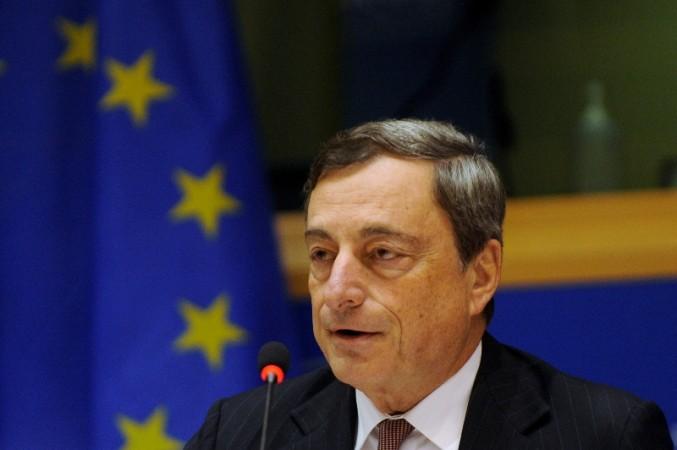
Mario Draghi, the head of the European Central Bank declared on Friday that they were committed to expanding their bond-buying program in order to stoke inflation and bring it back on track.
"We are committed to recalibrate the size, pace and composition of our purchases as necessary to deliver our mandate," Draghi said in a speech at a banking conference.
"We will continue to meet our responsibility—we will do what we must to raise inflation and inflation expectations as fast as possible, as our price stability mandate requires of us," Draghi added.
The ECB has set inflation targets to 2 percent. But rates have been hovering much below that with last month's annual rate edging up slightly to 0.4 percent. When inflation is low, debt financing gets harder for the economy and that in turn affects businesses and consumer spending.
The ECB has been trying to fix the struggling Eurozone economy. The central bank has introduced several reforms like slashing borrowing rates to record lows and the recently introduced Quantitative Easing program, which is supposed to pump in a trillion worth of Euros into the economy.
On Friday, the ECB confirmed that it has started its asset-backed bond- purchasing program and the bank will keep posting updates about the scheme on its website every Monday. The program is expected to last for two years.
Following publication of legal act on the implementation of the ABS purch. programme, the Eurosystem has started the purchases on 21/11/2014
— ECB (@ecb) November 21, 2014Mario Draghi, the head of the European Central Bank declared on Friday that they were committed to expanding their bond-buying program in order to stoke inflation and bring it back on track.
"We are committed to recalibrate the size, pace and composition of our purchases as necessary to deliver our mandate," Draghi said in a speech at the Banking Conference.
"We will continue to meet our responsibility—we will do what we must to raise inflation and inflation expectations as fast as possible, as our price stability mandate requires of us," Draghi added.
The ECB has set inflation targets to 2 percent. But rates have been hovering much below that with last month's annual rate edging up slightly to 0.4 percent. When inflation is low, debt financing gets harder for the economy and that in turn affects businesses and consumer spending.
The ECB has been trying to fix the struggling Eurozone economy. The central bank has introduced several reforms like slashing borrowing rates to record lows and the recently introduced Quantitative Easing program, which is supposed to pump in a trillion worth of Euros into the economy.
On Friday, the ECB confirmed that it has started its asset-backed bond- purchasing program and the bank will keep posting updates about the scheme on its website every Monday. The program is expected to last for two years.
The program comes a month after the ECB started a similar stimulus for covered bonds – a secure form of debt backed by real estate – which has already helped it gather $13.5 billion.
Though Draghi boosted hopes for the Eurozone's recovery with the bond-buying program, doubts about its effectiveness still linger. Some experts say that the Quantitative Easing will take off pressure from regions like France, Berlin and Paris to reform their economies and boost lending, according to The Financial Times.
A poll of experts by the publication showed low confidence in ECB's bond-buying program with many saying it would not help boost growth in the Eurozone. But some are still ready to wait and watch.
"The ECB's goal is to expand its balance sheet to help deal with low inflation and to resuscitate the ABS market to get lending to the real economy. Whilst Draghi's program has shone a positive spotlight on the asset class, only time will tell if this is just a PR exercise, as some think, or whether the ECB can buy in good size," Ope Agbaje, a London-based securitized products analyst at Neuberger Berman Group LLC told Bloomberg before the purchase-program started on Friday.

















